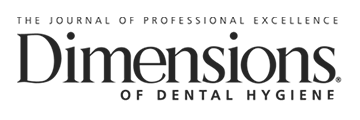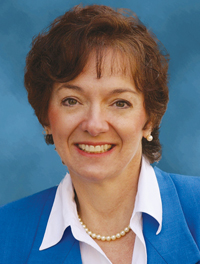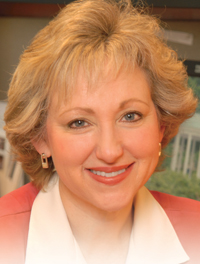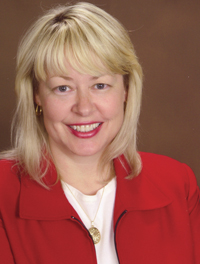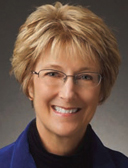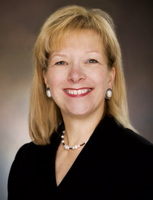 As provost and vice president for academic affairs at the University of Detroit Mercy (UDM), Pam Zarkowski, BSDH, MPH, JD, serves as the university’s chief academic officer and is responsible for the administration of all academic departments and programs. A faculty member in UDM’s School of Dentistry (UDMSD) since 1978, Zarkowski became a professor in 1994. She continues to teach community dentistry and legal and ethical concepts to predoctoral, dental hygiene, and graduate students at UDMSD.
As provost and vice president for academic affairs at the University of Detroit Mercy (UDM), Pam Zarkowski, BSDH, MPH, JD, serves as the university’s chief academic officer and is responsible for the administration of all academic departments and programs. A faculty member in UDM’s School of Dentistry (UDMSD) since 1978, Zarkowski became a professor in 1994. She continues to teach community dentistry and legal and ethical concepts to predoctoral, dental hygiene, and graduate students at UDMSD.
A former president of the American Dental Education Association (ADEA), Zarkowski is president-elect of the American Society for Dental Ethics. During her tenure as ADEA president, she helped create the ADEAGies Foundation, which focuses on improving the oral health of the public through programs that support dental education, research, leadership, and recognition. Zarkowski is also a faculty member for the ADEA Leadership Institute and Allied Leadership Institute programs, and she received the ADEA Distinguished Service Award in 2011. A prolific writer, Zarkowski has contributed greatly to the literature on community oral health and legal and ethical issues for dental professionals.
You earned a juris doctor (JD) degree more than 10 years after becoming a dental hygienist. What drew you to study law?
A number of factors attracted me to the legal field. I earned a master’s degree in dental public health and a teaching certificate in community dentistry 3 years after graduating from dental hygiene school. Seven years later, I decided to pursue a doctoral degree. My interest in ethics and professionalism led me to consider law, but, most important, I believed the JD would provide a strong foundation that would assist me as an educator. I knew the expertise gained from a law degree would equip me with a unique niche to teach both students and practitioners. In addition, I had aspirations of becoming an administrator, and the JD would be valuable in that role, as well. I also felt it would give me additional advocacy skills and help me transition to another career, such as a lobbyist or working for a special interest group focused on access-to-care issues, if I ever decided to leave academia.
What does a typical work day look like for you?
My days are spent seeking information, planning, implementing, or responding, and, in between all of that, sending and answering emails and attending meetings. I get to work early and most days I don’t leave until 7 pm or 8 pm. I still teach dental hygiene and predoctoral students. I spend a lot of time reading and responding to emails, but the majority of my day is spent in meetings with administrators and other key groups at the university. I have regular meetings with UDM leadership—deans, faculty leaders, and key directors who report to me. I manage a lot of challenges, which can include student issues, legal/ethical dilemmas, or faculty/administrator inquiries. I attend many university events, representing myself or the university’s president. Due to my tight schedule, I usually work one weekend day each week, so that I can address projects or tasks that require my attention as provost.
Describe a hurdle you have faced in your career. How did you overcome it?
One of the biggest challenges I encountered was serving as an administrator in a dental school without a dental degree. As I moved up the administrative ladder in UDM’s School of Dentistry, I was given additional responsibilities for decision making. For the most part, I was well respected by faculty, dentists, and dental hygienists. On occasion, however, I would be reminded that I did not have a dental degree—with the implied message that my decision was neither valued nor respected. I learned early in my career—whether as a dental hygiene program director, or later as the executive associate dean of the dental school—that it was important for me to silence those criticisms through my actions, critical thinking, decision making, and professionalism. While earned degrees and credentials are valuable tools and resources, I knew I had to consistently demonstrate my ability to lead. I felt obligated to model the behaviors I expected of others by respecting everyone with whom I interacted, even if they treated me poorly. I was always prepared, knowledgeable, and confident. I rarely said no to a challenge and was never afraid to work hard. Finally, I consistently showed I could tackle a project alone, or collaborate as part of a team.
How is dental hygiene education changing in light of expanding practice acts and more diverse job opportunities?
Dental hygiene education is at a pivotal point in its history. Throughout my career, discussion has been ongoing about expanding the roles of dental hygienists, increasing their competency, and improving access to care. I chose to earn a Master of Public Health degree because I felt the knowledge and skills gained from this course of study would assist me in obtaining a position in which I could positively impact oral health—whether as a manager, advocate, educator, or researcher. Expanding practice acts have impacted dental hygiene education and practice on a number of levels. Educators are more thoughtful in developing and delivering curricula. Changing the scope of practice requires rethinking the key elements necessary to graduate competent dental hygienists who are prepared to treat patients in any setting. Dental hygiene students are expected to use critical thinking and evidence-based decision making. Interprofessional education is one of the most evident signs of change in dental hygiene education. The emphasis on collaborating with clinicians beyond the dental team is an incredible step toward treating the “whole” patient—not just the mouth. It also provides an opportunity for dental hygienists to educate and inform other allied health professionals about the relationship between oral and systemic health.
Dental hygiene education also is providing graduates with the skills necessary to have a strong voice as members of the dental team. Clinicians must use their skills and knowledge in their diagnosis of patients, which includes effective assessment, treatment planning and provision, and ongoing evaluation.
I am truly excited about the opportunities now available to dental hygienists. The clinicians who seek a career in private practice are the core of our profession, and this setting will continue to serve as an attractive option. Expanded scope of practice and changes in dental practice acts contribute to the quality of care that is provided and recognize the abilities of dental hygienists.
I am a firm believer that dental hygienists can seek multiple career paths. Clinical dental hygienists may work in private practice, public health, or mobile and community-based sites. More educators and administrators in dental hygiene education are needed. Opportunities abound in research and industry, as well. While the roles and responsibilities for dental hygienists continue to expand, I also believe we need to extend our reach. Dental hygienists need to educate other health professionals, government officials, legislators, and licensing board members about the value of dental hygienists in a particular employment or practice setting. For example, I believe hospital systems should employ a team of dental hygienists (hospital hygienistry) that would provide treatment and oral health services, educate patients and caregivers, and work with health care teams in caring for patients. Hospitalized patients would greatly benefit from dental hygiene care, including but not limited to first-time parents, accident and stroke victims, and cancer patients. School systems would be enhanced if a staff dental hygienist worked with students, teachers, coaches, administrators, and parent groups. Universities and colleges—specifically those without a dental hygiene or dental school on campus—should employ a dental hygienist to provide care to students. Many of these settings could utilize telehealth or other technology.
Dental hygiene education is changing to incorporate the knowledge and skills necessary to graduate competent providers. I am hopeful that dental hygiene programs are introducing students to alternative career options, as well as socialization skills that will prepare them for “real world” experiences. I encourage lifelong learning for all members of the dental hygiene profession. Creating professional development opportunities for graduate dental hygienists to attain the skills necessary to work in alternative settings is critical. Many of the abilities held by dental hygienists—including interpersonal and communication skills—are valued by employers. I am certain many licensed dental hygienists would participate in professional development opportunities that expand their ability to work in a variety of settings. This education would also need to teach dental hygienists how to advocate for themselves so they can demonstrate what dental hygienists have to offer professionally.
